SF Manga 101: Appleseed
Glenn Hough (gallyangel) is a nonpracticing futurist, an anime and manga otaku, and is almost obsessive about finishing several of the lists tracked on WWEnd. In this series on SF Manga Glenn will provide an overview of the medium and the place of science fiction within it.
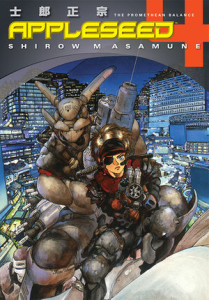 When I was charting out the mangas I’d be blogging about, my best of the best list, and why those mangas should matter to us, the SF reading public, Masumune Shirow found his way onto the list three times. Conversely, nobody else even got a second series. That’s the level of difference we’re talking about with Shirow.
When I was charting out the mangas I’d be blogging about, my best of the best list, and why those mangas should matter to us, the SF reading public, Masumune Shirow found his way onto the list three times. Conversely, nobody else even got a second series. That’s the level of difference we’re talking about with Shirow.
I find it highly ironic that the ideas for Ghost in the Shell (GITS) came out of Appleseed. And in my opinion, knocked Appleseed out of a top three slot for SF Manga. Not out of the top five, but out of the top three.
This is what the publisher says about the first volume of Appleseed.
World War III is over, and nomad soldier Duenan Knute and her cyborg partner Briareos struggle to survive in the abandoned cities and demilitarized zones of the post-war wasteland, the “Badside.” Matters appear on the upswing, however, when they are found and brought to Olympus, an urban utopia and centerpiece for the reconstruction of civilization. Duenan and Bri join the Olympus police, a force that seems hardly necessary in such a paradise. But, like in most pretty pictures, perfection is an illusion, and Olympus’s peaceful facade hides a dark secret, a violent struggle between human and cyborg that could once again plunge the world into war… and genocide.
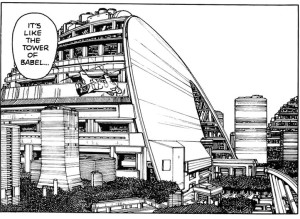 Since my background is in Future Studies, I have argued in other forums that once you get beyond the narrow visions of both business and political futures, the options truly open themselves up and one immediately needs help from sister disciplines. In this case Utopian Studies, Peace Studies, and Science Fiction. Science Fiction is like the idea generator. Utopian Studies is for ideals. Peace Studies is lots of nuts and bolts about how to get things done, while Future Studies is an overarching superstructure to link everything together.
Since my background is in Future Studies, I have argued in other forums that once you get beyond the narrow visions of both business and political futures, the options truly open themselves up and one immediately needs help from sister disciplines. In this case Utopian Studies, Peace Studies, and Science Fiction. Science Fiction is like the idea generator. Utopian Studies is for ideals. Peace Studies is lots of nuts and bolts about how to get things done, while Future Studies is an overarching superstructure to link everything together.
That’s where Shirow and Appleseed come back into the discussion. A meditation on utopian ideals does indeed sound unlikely for the subject of a manga, but that is essentially what Appleseed is. It’s even stranger when one first understands that Shirow’s main structural motif is the police procedural. With reflection this strangeness evaporates. One of the hallmarks of the police procedural is that officers of the law generally have access to all levels of their society, roaming at will to illuminate every aspect of society the author cares to show us. There is always the tension in any society between what is celebrated in the halls of power and what happens on the streets. The down trodden (if they exist at all), or the powerless, are the weakest links in any society. Just as a chain is only as strong as it’s weakest links, so too shall a society be judged by it’s weakest links and how it treats those individuals.
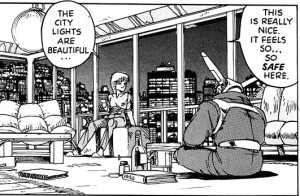 This is the background stage setting that Duenan and Briareos operate in front of as Appleseed unfolds.
This is the background stage setting that Duenan and Briareos operate in front of as Appleseed unfolds.
Shirow’s conclusions to his utopia building are both pure SF and pure Utopian Studies. Any attempt at utopia is foolish and doomed to failure with humans (as they currently are). All writers of utopias know and understand this point. Shirow’s SF spin is the bioroid. Think human 2.0, where the traits that run counter to utopian ideals are simply no longer present. Governance, by the bioroid, is an essential part of the mix. This leaves human 1.0 in the position of being wanted and needed by the new society of bioroids, but also cut off from the topmost decision making positions. In other words, someone else has to be in charge because the humans would just fuck it up, like normal.
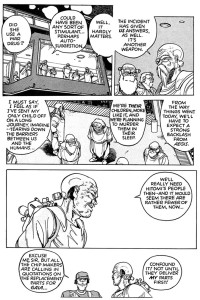 Political power then, like always, is the bone of contention. This shows most forcefully in the roles Duenan and Briareos land for themselves in Eswat, which deals with terrorist actions.
Political power then, like always, is the bone of contention. This shows most forcefully in the roles Duenan and Briareos land for themselves in Eswat, which deals with terrorist actions.
At this point, Shirow shows us a very 80’s, or perhaps a very Japanese approach to combating terrorism. Duenan and Bri are part of the police, a special force set up to combat terrorists. When Shirow writes GITS only a few years later, The Major is part of a special branch of government, tasked with combating terrorism through black ops and intelligence work.
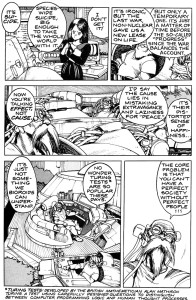 Appleseed‘s original run was from February 1985 to April of 1989. Ghost in the Shell‘s initial release was between May 1989 to November of 1990. So in that span of time, Shirow’s thinking on the issue of terrorism changed from special police to a special branch of government, to combat it. I think this evolution in Shirow’s thinking is very interesting given several indicators coming out of the current U.S. administration. What I’ve heard said by various people in this administration, is a willingness to drop the heavy handed boots-on-the-ground approach that we’ve been engaged in, so that we can focus in on intelligence, black ops, strike teams, drones, that sort of an approach. Are we seeing the same evolution in thought, which Shirow mapped out 23 years ago? Perhaps. In 1995 after the Oklahoma City bombing, it was the FBI which took the lead, investigating the incident as a crime. Since then, we’ve entered the boots-on-the-ground response to terrorism, while not so quietly, the CIA has been ramping up everything they do, while adding the majority of the drone programs to their auspices. It’s as if they’re preparing for the eventual end to the boots-on-the-ground phase, so the phase where the black world of the CIA protects America and the World, can fully commence.
Appleseed‘s original run was from February 1985 to April of 1989. Ghost in the Shell‘s initial release was between May 1989 to November of 1990. So in that span of time, Shirow’s thinking on the issue of terrorism changed from special police to a special branch of government, to combat it. I think this evolution in Shirow’s thinking is very interesting given several indicators coming out of the current U.S. administration. What I’ve heard said by various people in this administration, is a willingness to drop the heavy handed boots-on-the-ground approach that we’ve been engaged in, so that we can focus in on intelligence, black ops, strike teams, drones, that sort of an approach. Are we seeing the same evolution in thought, which Shirow mapped out 23 years ago? Perhaps. In 1995 after the Oklahoma City bombing, it was the FBI which took the lead, investigating the incident as a crime. Since then, we’ve entered the boots-on-the-ground response to terrorism, while not so quietly, the CIA has been ramping up everything they do, while adding the majority of the drone programs to their auspices. It’s as if they’re preparing for the eventual end to the boots-on-the-ground phase, so the phase where the black world of the CIA protects America and the World, can fully commence.
So, did Shirow map out these real world changes in the thinking about how to handle terrorism over 23 years ago in Appleseed and GITS, or didn’t he? I think a far more detailed examination would lend it’s support to that contention.
 It’s been said elsewhere that in both Utopia writing and in SF, these genres especially, are rooted in the now; in the concerns of today. Utopia fiction tries to envision something better, getting rid of the current problems, while SF deals with the 1001 what ifs of fiction, which, no matter how skilled the writer, still are rooted in the present. Appleseed stands at the crossroads for these two impulses and that is why I think we need to pay attention.
It’s been said elsewhere that in both Utopia writing and in SF, these genres especially, are rooted in the now; in the concerns of today. Utopia fiction tries to envision something better, getting rid of the current problems, while SF deals with the 1001 what ifs of fiction, which, no matter how skilled the writer, still are rooted in the present. Appleseed stands at the crossroads for these two impulses and that is why I think we need to pay attention.
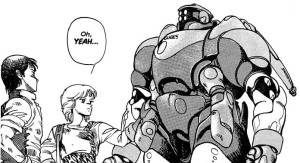 Appleseed’s initial comic run in the U.S. was with Eclipse International, in conjunction with Studio Proteus. Proteus was absorbed by our friends at Dark Horse, so they remain the place to get all four volumes of the main Appleseed series. Dark Horse has also published a few extra bits, the Data Book, the ID book, and the Hypernotes which contains the unfinished fifth chapter. Appleseed is one of those works which was interrupted by other things. There’s been no indication other than a vague wishfulness on Shirow’s part that he will ever return to Appleseed with the intent to finish it.
Appleseed’s initial comic run in the U.S. was with Eclipse International, in conjunction with Studio Proteus. Proteus was absorbed by our friends at Dark Horse, so they remain the place to get all four volumes of the main Appleseed series. Dark Horse has also published a few extra bits, the Data Book, the ID book, and the Hypernotes which contains the unfinished fifth chapter. Appleseed is one of those works which was interrupted by other things. There’s been no indication other than a vague wishfulness on Shirow’s part that he will ever return to Appleseed with the intent to finish it.



















 Full Details
Full Details


No comments yet.
Sorry, the comment form is closed at this time.